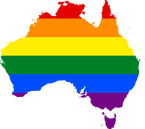 I am writing as a member of a group of people who are often hidden and ignored in conversations about the relationship between LGBTI+ rights and ‘religious freedom’. For I am an openly transgender female Anglican priest, in duly regarded paid and active service in my religious community. Like other LGBTI+ people I experience the same needs for freedom and opportunity to love and serve. Yet I, and others like me (some whom have to hide publicly), also have to cope with being caught in the crossfire between certain types of LGBTI+ activism and reactionary Christian calls for greater ‘religious protection’. Often this debate is conducted without any reference to people like myself and measures are proposed which do not help our freedom or livelihoods. In writing, it is therefore my hope that the current Religious Freedom Review may pay proper attention to us and ensure that nothing is proposed which makes our often marginalised situation more problematic...
0 Comments
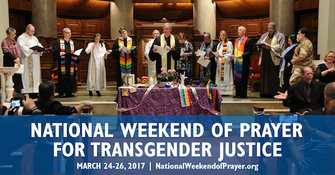 DLT has happily released a downloadable sample liturgy to publicise materials in the forthcoming book TransFaith and as a response to English church developments. At the same time, others have also been stirred to share or create as part of an increasing stream of life and love.. A good friend and fellow Brisbane Anglican colleague Cathy Laufer has for instance recently written a draft liturgy for a potential renaming ceremony for me, and other friends, like the St Brigid Community at Vancouver Anglican Cathedral, and one of The Sibyls (Christian transgender spirituality support group) leaders Susan Gilchrist, have also kindly shared their work with me - check out my prayer and worship resources section for several examples (and do let me know if you write your own!). There are many such seeds slowly beginning to germinate. It is good to see and a sign of the Holy Spirit moving afresh. For one of the sure indications of the Spirit moving is the renewing of prayer and worship in the light of new understandings and revaluing (especially of that which was been previously marginalised). This was striking during the campaign for women's ordination in which I was closely involved in England, and in other journeys of struggle which I have supported and been a part. So much creative, re-enlivening scholarship and imaginative prayer and worship emerges. A similar feature can now be seen among trans Christians and their allies as prayers, liturgies and other essential spiritual aids are emerging. Some of this is still a groaning of the Spirit, seeking expression. Yet it has a powerful, engaging, appeal. Even setbacks, like the recent Church of England bishops refusal to produce General Synod asked-for liturgy for trans affirmation, cannot hold it back. In fact, such controversies actually feed the Spirit! For these developments are grounded in the needs of God's children and the empowering of them to share their gifts more widely for the glory of God and the healing of others. 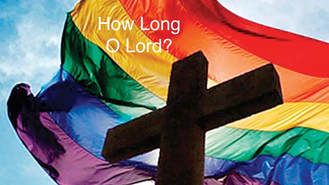 They say it is the hope that kills you. Every so often a Christian body does something to lift your heart and make you truly proud. A statement is made, a commitment displayed, a sign of genuine understanding revealed about the lives, faith, needs and gifts of LGBTI+ people. You begin to believe it is possible that we will move forward, together. Then you look around and what was written is qualified or changed, what was committed to is downgraded, what you thought was understanding is shown to be so partial and obscured. It happens again and again, as it just has, so clumsily, with the Church of England bishops' backflip on transgender Christian liturgical affirmation. Back in rushes the anger, the frustration, and the deep soul-seeking about whether it is worth persisting: all coupled with a renewed sense of betrayal and lack of integrity. How long O Lord?.. The other evening I did something usually considered unwise: I read the comments on a video by a transgender person on Facebook. This is usually something to be avoided by anyone, especially if you are gender diverse. What might seem almost worse, I even responded to some of the less than helpful contributions! However the exercise proved helpful in a number of ways and has deepened my sense of how we are all travelling together. (The video 'What it means to be transgender' was by writer and military veteran Charlotte Clymer, speaking out about coming out and transitioning, and was on the UK's Channel 4 News: more information here)...
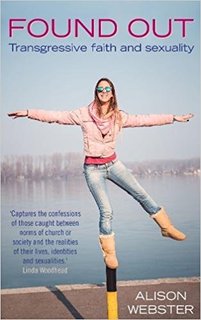 Are meaningful contemporary Christian sexual ethics possible? It depends where you look and to what you listen. No doubt many might be surprised, but there is actually a wonderful growing mine of resources, including Found Out: Transgressive faith and sexuality: the incisive and illuminating recent book by Alison Webster. Unfortunately, in bleak contrast, many 'official' Church statements have been far too blind, narrowed or vacuous, even within circles which purport to take human experience and the best of science and reason seriously. Over twenty years ago for example, as a priest in rural England, I vividly remember receiving an official declaration to Church of England clergy from the then Archbishops of Canterbury and York on the subject of marriage. It was unhelpful, seemingly constituting only a bald 'gate-keeper' reaffirmation of a theoretical position which no longer pertained if it ever did. It failed to recognise, never mind address, the pastoral realities faced by clergy: where almost every couple coming for marriage was already cohabiting; (some form of) sex before marriage was essentially de rigeur; and partners who were divorced, in various circumstances, were extremely common. Like the hastily put together statements on LGBTI+ issues of the time (sadly often since enshrined as a kind of fresh holy writ), it seemed like blinkers were the order of the day. Regrettably, things have not improved greatly, leading an increasingly large chasm between the actual sexual lives of faithful Christians and the Church as an institution. The 'official' Church has thus frequently appeared to be a frightened rabbit, hypnotised by the glare of the lights of contemporary sexuality, even when its pastoral practice, and many contributions of its best theologians, has often been quite otherwise. Today, in the face of further developments, not least the profound societal shifts in LGBTI+ understanding, it is hard to see how these things can hold together much longer. Happily, Alison Webster, in Found Out, is one of those who offers fresh and vital pathways, grounded in women's lived experience and a performative faith which leads to flourishing rather than stagnation and spiritual death... 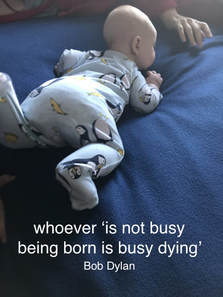 As I complete another full year of my own life, and in the wake of the celebrations of the nativity of Jesus, I have been pondering what it means to be born, spiritually speaking. For birth, like life itself, is easily taken for granted. Actually it is a great mystery, in the best sense of that word. Like gender, it is not simple or straightforward, as many assume. Rather, it is a continuing revelation and developmental process. Indeed I am currently very struck by how my baby grandchild is changing every moment, in response to every encounter and their growing awareness of self. It feels like they are being born afresh, in new ways, every second. Their 'birth' was clearly not finished at their literal entry into this life. Nor is it ever complete for any of us, at least in this life. Rather, each of us, as Bob Dylan once wrote in a notable lyric, is either 'busy being born or busy dying'. Perhaps this is also part of what transgender people have to share with the world in our own (re)birthing?... |
AuthorThe Revd Dr Jo Inkpin: Archives
March 2024
Categories
All
|
 RSS Feed
RSS Feed